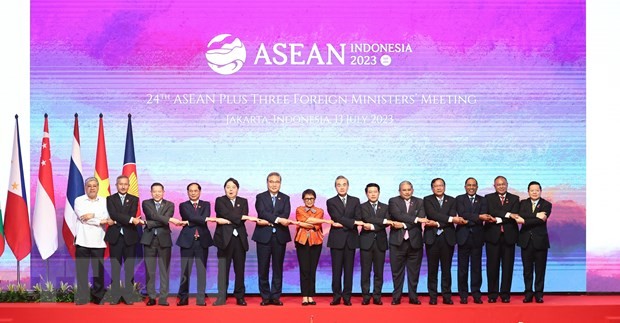(VOVWORLD) - The 56th ASEAN Foreign Ministers Meeting (AMM-56) and related meetings, which concluded in Indonesia on Friday, demonstrated the spirit of solidarity and responsibility of ASEAN members and affirmed the value of dialogue and cooperation within ASEAN, between ASEAN and its partners, and among all countries in a volatile world.
 Vietnamese Foreign Minister Bui Thanh Son (4th from left) and other top diplomats at the ASEAN+3 meeting in Jakarta, Indonesia on July 13, 2023. (Yonhap/VNA) Vietnamese Foreign Minister Bui Thanh Son (4th from left) and other top diplomats at the ASEAN+3 meeting in Jakarta, Indonesia on July 13, 2023. (Yonhap/VNA) |
AMM-56 was ASEAN's most important Foreign Ministers Meeting of the year. Besides a meeting of the ten ASEAN countries, there were meetings between ASEAN and each partner, the ASEAN+3 Foreign Ministers Meeting, the East Asia Forum’s Foreign Ministers Meeting, and the ASEAN Regional Forum. 20 conferences on security, peace, and regional economic resilience were held during the event.
Strengthening ASEAN’s resilience and flexible adaptation
The ASEAN Foreign Ministers agreed to enhance ASEAN's resilience and flexible adaption to future opportunities and challenges. ASEAN needs to take the lead in shaping an open, transparent, inclusive, and rules-based regional architecture with the active participation and responsible contribution of each member and partner.
Indonesian Foreign Minister Retno Masurdi said: “First, maintaining ASEAN's credibility. This means that the ASEAN Charter must be consistently implemented, including in the decision-making process during emergency situations. We must prove that united we can address existing challenges, while also ready to anticipate and respond to future challenges. That is why a long-term ASEAN Vision is so crucial.”
She added that “ASEAN must remain in the driver seat in navigating regional dynamics. ASEAN needs to send a clear message that it will never become a proxy in great powers' rivalry.”
Marsudi said that the Treaty of Amity and Cooperation must be abided by all. ASEAN must be at the forefront in building inclusive regional architecture.
In order to enhance ASEAN's capacity, readiness, and resilience, member countries agreed to promote cooperation in supply chain resilience, digital transformation, and energy and food security.
At AMM-56 and related conferences, for the first time, the ASEAN Vision for the Indo-Pacific was integrated into negotiations with partner countries. In the context of global complications, the conferences convinced countries possessing nuclear weapons to sign the Treaty on the Southeast Asia Nuclear Weapons-Free Zone, finalize guidelines for concluding negotiations on a Code of Conduct in the East Sea (COC), and complete the ASEAN Maritime Vision. AMM-56 issued a Joint Statement calling for making the East Sea a sea of peace and cooperation.
Partners committed to cooperating with ASEAN
In a spirit of frank and substantive dialogue, ASEAN and its partners held discussions on many issues of mutual concern. They pledged to support ASEAN’s central role and engage in comprehensive, substantive, and sustainable cooperation. The spirit was illustrated by the adoption of several documents, including a Joint Statement on an ASEAN-New Zealand Vision for the Indo-Pacific, an addendum to the action plan for implementing the ASEAN-India Comprehensive Strategic Partnership, and a Joint Statement on the 5th anniversary of the ASEAN-Russia Strategic Partnership (2018-2023).
ASEAN and China acknowledged progress in negotiating a Code of Conduct (COC) in the East Sea – the adoption of Guidelines for the early completion of the COC. The two sides agreed to make 2024 a year of people-to-people exchanges between ASEAN and China.
Australia announced a plan to provide 530 million USD in development assistance to ASEAN and the UK announced partnership programs worth 148 million USD over the next five years. The Republic of Korea said it is implementing its commitment to double its contribution to the ASEAN-RoK Cooperation Fund from 16 million USD last year to 32 million by 2027, and allocate 200 million USD to joint cooperation projects.
The Foreign Ministers of ASEAN+3 (China, the RoK, and Japan) emphasized the maintenance and promotion of economic, trade, and financial cooperation, epidemic prevention and response, cooperation to ensure food security and sustainable agriculture, and effective deployment of the ASEAN+3 Emergency Rice Reserve Fund.
ASEAN is facing challenges both internally and externally. However, with 56 years of development and increasingly close cooperation with its partners, ASEAN is confident of overcoming challenges and adapting flexibly to boost development.